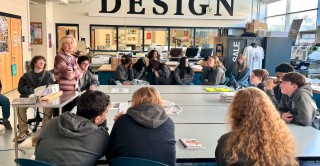
Stanley, Central's seasonal resident duck, returned to campus earlier this month and brought seven new ducklings into the world on May 6.
Central Environmental Health and Safety Coordinator Kelly Selby and her team gave the new family some time to get settled in and explore the nest site before escorting them on May 14 to their usual neighborhood at Stanley Quarter Park in New Britain. Watch their journey online on YouTube at https://www.youtube.com/watch?v=E9O2nk4p0wA/.
This spring, a second female mallard followed Stanley's lead and established her own nest in the same secluded area. After a brief social media campaign students decided to name the second duck after Connecticut Governor Ella Grasso. Ella hatched 10 ducklings a week after Stanley’s brood arrived, and Ella’s new arrivals quickly introduced themselves to Stanley and her ducklings. Ella’s family moved to the park on May 17.
Both nest locations don't offer a direct exit route for pre-fledge ducklings, but the Central family was ready to assist. For the fourth spring running, female mallards have set up housekeeping on the Central campus in a location that provides excellent shelter from predators and limited human interaction.
Stanley is one of several mallards that were caught and tagged by the Connecticut Department of Energy and Environmental Protection (DEEP) at Stanley Quarter Park in New Britain. DEEP is monitoring ducks as part of an initiative to assess mallards' nesting success, including brood movement and habitat selection. Stanley was tagged in September 2022, and DEEP named her after the park.
The typical incubation period for ducks is 26 days. Stanley was first spotted on her nest this year in early April — about two weeks earlier than last year. Ella arrived shortly thereafter.



